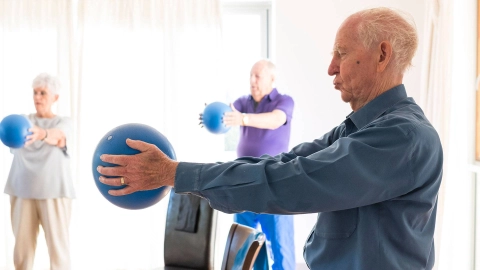Care Care group homes: group living with home support
Care group homes are a way of living a self-determined life even in old age. These group living arrangements with home support qualify for special funding. What types of care group homes are there? How are new group homes and conversion measures supported?
At a glance
- Care group homes aim to enable people to receive high-quality care without giving up their privacy and independence.
- Care group homes may be self-managed or provider-managed.
- Residents are cared for and supported by one or more on-site staff members.
- Long-term care insurance supports care group homes through various benefits and measures. These include the group home supplement and start-up grants.

Care group homes – an independent life with shared support
New types of living arrangements offer an opportunity to live a self-determined life for as long as possible, even in old age. These include, for example, multi-generational houses or supported living. Increasingly, people in need of care are choosing the alternative option of living in a group home.
Care group homes are a way for persons in need of care to live together and benefit from shared supports without losing their privacy and independence. As in other living communities, residents in care group homes usually have their own individual rooms. Additional rooms are also often available that can be used for group activities.
The residents in a care group home are supported by at least one on-site staff member on a daily basis. Regardless of the nursing care provided, the on-site staff act as a point of contact for all people living in the care group home. They can help organize the daily routine and accompany residents on shopping trips or to appointments with authorities, for example. Several on-site staff members may be employed depending on the size of the care group home and the needs of the residents.
What different types of group homes are there?
When choosing a care group home, it’s important to be aware that different types exist. A distinction is made between provider-managed and self-managed care group homes. There are benefits and drawbacks to consider in relation to each type.
Provider-managed care group homes
A provider-managed care group home is managed by a third-party operator. This may be a care or support service, a local authority, community association or a private individual. This third-party provider makes decisions about the various organizational matters relating to the running of the care group home. These include, for example, designing the layout of the communal spaces and deciding who is permitted to move into the home. The person responsible must comply with the regulatory requirements that apply in the individual federal state, to the extent that these are enshrined in federal state law. Compliance with these laws is monitored and inspected by the care home supervisory authority (“Heimaufsicht”).
Living in this type of care group home means that there are many organizational matters you don’t need to worry about. However, options for making your own decisions may be limited.
Self-managed care group homes
In a self-managed care group home, the residents themselves take care of all organizational and legal matters relating to the group home. For example, they decide who may move into the home and what the daily routine looks like. The care home supervisory authority is not responsible for this type of care home and therefore cannot be involved in the event of complaints about the care group home.
This type of care group home gives residents greater freedom to make decisions. As a prerequisite, the residents must be capable of representing their own interests. Alternatively, a loved one must be available to make decisions on behalf of the person in need of care.
Which contracts need to be drawn up?
While people living in a nursing home generally only conclude one contract with the home, moving into a care group home necessitates the signing of several contracts at once.
These individual contracts also differ between provider-managed care group homes and self-managed care group homes.
Rental contracts
In a provider-managed care group home, the residents conclude a rental contract with the provider. This contract defines how the living space is used and which costs are incurred as a result. Residents in a self-managed care group home also conclude a rental contract. In this case, however, this is normally done directly with the landlord who owns the property.
Contracts with on-site staff
Residents in the group care home jointly employ one or more on-site staff members. On-site staff provide the residents with daily support. Their specific duties are defined in a contract.
Contracts with care services
To enable a home care service to visit the care group home, residents of the home who are in need of care conclude individual care contracts with the service. Any residents who require support with medical care, such as taking medication or having dressings changed, must also conclude a separate treatment contract with the care service. Residents in a care group home should be able to choose for themselves which care service to use.
Contracts with support services
In some cases, it makes sense to have daily support provided by a support service in addition to or instead of a home care service.
While a care service can provide nursing care and medical support, a home support service helps with daily tasks and offers psychosocial support. A home support service can be employed by individual residents or jointly by all members of the living community in the care group home.
Living community contracts
A living community contract helps regulate how individuals are going to live together as a community in a care group home. For example, this contract may specify which items needed on a daily basis are to be paid for from the household’s joint budget. This applies, for example, to the cost of food or care products for the household.
What is the cost of living in a care group home?
There are various costs associated with living in a care group home. These include the costs of rent, as well as additional charges, such as power, water and heating. Other costs apply to meals and any care and support services that may be needed. Additional expenses, such as leisure-time activities and excursions, also have to be covered.
For many people, the difference in costs between living in a care group home and in a nursing home is an important question.
There is no straightforward answer. Generally speaking, however, there tends to be very little difference between the costs associated with these two forms of care at the present time. In some cases, the costs of living in a group care home may even exceed those of living in a nursing home.
What special benefits are available for group care homes?
Long-term care insurance provides support to all people in need of care through specific benefits. These include the care allowance, non-cash care benefits and the additional relief allowance.
For people in need of care who want to live in a care group home, long-term care insurance offers additional support options.
However, while some costs are covered by the benefits offered by long-term care insurance funds, most of the costs of living in a care group home must in fact be paid for by the residents themselves.
For people on a low income, additional supports are available (more details on these are provided at the end of this section).
The specific benefits available to residents of care group homes are listed below:
Group home supplement
One of the benefits to support care group homes is the group home supplement (“Wohngruppenzuschlag”), which is paid at a flat rate of 224 euros per month. Care recipients living in care group homes can apply for the group home supplement as well as other long-term care insurance benefits – such as the care allowance or non-cash benefits for care at home. Care recipients assigned care grade 1 also receive the group home supplement if they live in a care group home, regardless of whether they are receiving other long-term care insurance benefits.
The group home supplement is only paid if conditions such as the following are met:
- The care recipient must live in a home with at least two and at most eleven other residents.
- At least three of the care group home residents must be in need of care.
- The care group home residents must employ on-site staff to help with organizing, managing, looking after and encouraging communal living. On-site staff are separate from staff who provide residents with nursing care.
- The scope of nursing care provided must not be equivalent to that provided in full-time residential care.
The group home supplement must be used to pay for on-site staff.
Grant for renovation measures
Certain building requirements must be met in order to make a home suitable for long-term care. Care recipients at all care grades are therefore entitled to apply for a grant of up to 4,180 euros for essential building modifications to their homes. The building modifications undertaken must be for the purpose of significantly improving the care situation of the care recipient or promoting their ability to live a self-determined life.
Up to four members of a care group home who are in need of care can receive the full grant, which adds up to a total of 16,720 euros. If there are more than four people with the entitlement in the home, the overall sum of 16,720 euros is divided proportionally among the residents.
Setup grant
If a number of people in need of care decide to establish a self-managed care group home, they can apply to their long-term care insurance provider for a setup grant. To apply for this grant, the group care home must be established by at least three care recipients in accordance with the Long-Term Care Insurance Act (“Pflegeversicherungsgesetz”). Funding is only available for the renovation of existing living space. It can be used for all measures that aim to permanently improve the living situation by making it more age-appropriate or accessible – for example, by installing a floor-level shower or widening doorways.
The setup grant amounts to a maximum of 2,613 euros per person and is available to all care recipients at all care grades. However, an upper limit of 10,452 euros in total can be granted to each care group home. If more than four residents in need of care apply for the start-up grant, the total amount is divided proportionally among them.
Grants are only paid if the founding members of the care group home have actually had to pay for renovation costs. As a rule, they can only be drawn down following the submission of receipts for the costs incurred.
Important: Care group home residents are required to apply for a start-up grant within a period of one year. The deadline for applications is set at one year from the date when the requirements for the start-up grant have been met. The long-term care insurance funds can answer questions about the precise terms and procedures relating to start-up grants.
What support is available to people on low incomes?
In certain cases, people who don’t have their own income or assets can receive support from their social welfare office (“Sozialamt”). People on a low income can also apply for housing benefit (“Wohngeld”).
More information about housing benefit is available on the consumer advice center website.
Detailed information about the financial supports available from social welfare offices is also provided in the article discussing help with care costs.
How can I find a place in a care group home?
In many municipalities, there are existing care group homes that offer places for new residents. Information about these places is available from the relevant local citizens’ office (“Bürgeramt”). In many cases, social welfare offices and home care supervisory authorities also have an overview of places that are currently available.
Special care group homes are available for people with dementia. Local Alzheimer associations or care support points can help people access places in these group homes.
Anyone who wants to set up their own care group home should begin by considering who else could join them as members of their living community. Putting up a notice in places where senior citizens meet or taking out a small advert are possible ways to find potential members. Care support centers and home care or support services that look after care group homes may also know about people who might be interested.
Where can I find more information about care group homes?
People with statutory health insurance can ask their long-term care insurance fund for advice about care group homes.
Those with private health insurance should contact Compass Private Pflegeberatung GmbH.
Phone: 0800 101 88 00
Advice is also available from regional care support points and information centers run by local authorities and welfare and social associations. It is advisable to find out about the quality of the advice provided in advance.
Local advice centers can be found using the database of the Center for Quality in Care (Zentrum für Qualität in der Pflege, ZQP).
For more information about legal provisions, costs and support options for care group homes, see the consumer advice center website.
Anyone wishing to set up a care group home should first think about potential co-residents. To find them, putting up a notice where senior citizens meet or taking out a small advert might help. Care support centers and outpatient care or support services that already look after care group homes may also know about people who might be interested.
- Bundesinteressenvertretung für alte und pflegebetroffene Menschen e.V. (BIVA-Pflegeschutzbund). Alternative Wohnformen. Die Pflege-Wohngemeinschaft. Aufgerufen am 05.12.2024.
- Bundesinteressenvertretung für alte und pflegebetroffene Menschen e.V. (BIVA-Pflegeschutzbund). Länder-Heimgesetze. Aufgerufen am 05.12.2024.
- Bundesministerium für Gesundheit. Alternative Wohnformen – Pflege-Wohngemeinschaften. Aufgerufen am 05.12.2024.
- Bundesministerium für Gesundheit. Publikation: Pflegeleistungen zum Nachschlagen. Aufgerufen am 28.05.2024.
- Bundesministerium für Gesundheit. Publikation: Ratgeber Pflege. Aufgerufen am 28.05.2024.
- Bundesministerium für Justiz. Sozialgesetzbuch (SGB) – Elftes Buch (XI) – Soziale Pflegeversicherung. § 45e SGB XI Anschubfinanzierung zur Gründung von ambulant betreuten Wohngruppen. Stand: 27.03.2024.
- compass private pflegeberatung GmbH. Zuschüsse für die Pflege-WG. Aufgerufen am 05.12.2024.
- Klie, T; Heislbetz, C; Schuhmacher, B; Keilhauer, A; Rischard, P; Bruker, C: Ambulant betreute Wohngruppen. Bestandserhebung, qualitative Einordnung und Handlungsempfehlungen. Abschlussbericht. AGP Sozialforschung und Hans-Weinberger-Akademie (Hrsg.). Studie im Auftrag des Bundesministeriums für Gesundheit. Berlin. Stand Mai 2017.
- Verbraucherzentrale. Publikation: Die Pflege-Wohngemeinschaft: Eine Alternative zum Heim. Stand 17.04.2024.






